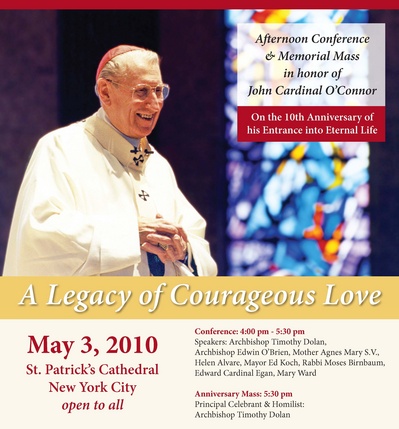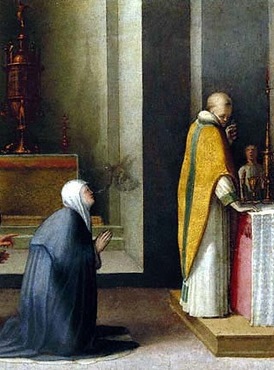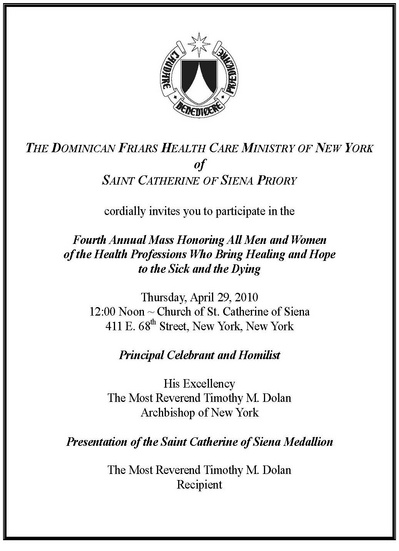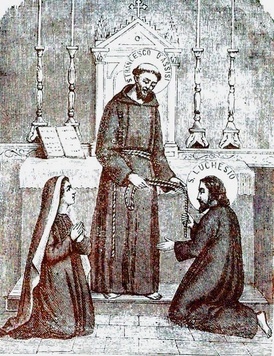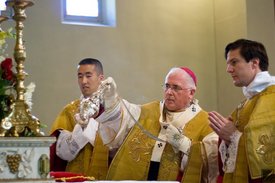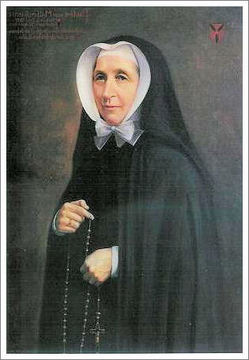 In her retreat of 1843, Blessed Pauline von Mallinckrodt wrote in her notes,
In her retreat of 1843, Blessed Pauline von Mallinckrodt wrote in her notes,
Church of the ‘Times’
Thanks to Gary Stern at Blogging Religiously for bringing the recent Kenneth Woodward article, “Church of the ‘Times‘” to my attention. Commonweal magazine will be publishing a print edition of this article in the May 7, 2010 edition. Woodward’s perspective is just one among many, but does it have merit????
10th Anniv. of Death of Cardinal John O’Connor’s death marked by Mass and retrospective
Saint Catherine of Siena, virgin and Doctor of the Church
The love of God has been poured into our hearts, alleluia, by His spirit living in us, alleluia.
God of wisdom, You made Saint Catherine burn with divine love in contemplating the Lord’s passion and in serving Your Church. With the help of her prayers may Your people, united in the mystery of Christ, rejoice forever in the revelation of His glory.
Ordination season is upon us. That is, you’ll may be hearing of or attending episcopal, priestly and diaconal ordination ceremonies. If you get the opportunity please attend an ordination ceremony. In reading Saint Catherine of Siena’s Dialogues, I thought her dialogue “The Qualities of Good Ministers in the Church” (119) as an appropriate reflection for all engaged in seminary formation at one level or another and for those already in service to the Church. Saint Catherine said:
I told you
that [my ministers] have taken on the qualities of the sun. Indeed, they are
suns, for there is in them no darkness of sin or ignorance, because they follow
the teaching of my Truth. Nor are they lukewarm, because they are set ablaze in
the furnace of my charity. They have no use for the world’s honors and ranks
and pleasures. Therefore, they are not afraid to correct. Those who do not
hanker after power or ecclesiastical rank have no fear of losing it. They
reprove [sin] courageously, for those whose conscience does not accuse them of
sin have nothing to fear.
So this pearl [of justice] was not clouded over in
these anointed ones, these christs of mine, of whom I have told you. [St
Catherine here is referring to holy people of the past who showed themselves to
be good ministers, and whose qualities are always needed in the Churcch]. No,
it was luminous. They embraced voluntary poverty and sought after lowliness
with deep humility. This is why they are not annoyed by people’s derision or
abuse or slander, or by the insult or shame or pain or torture. They were
cursed, and they blessed. They endured with true patience, likely angels and
more than angels -not by nature, but because of the sacramental grace given
them from above to be the stewards of the body and blood to my only begotten
Son.
How humbly they governed and communicated with their subjects! With what
hope and lively faith! They had no fear or worry that either they or their
subjects would be lacking in temporal goods, so they generously gave out the
Church’s possessions to the poor. Thus they fulfilled to the utmost their
obligation to divide their temporal goods to meet their own needs and those of
the poor and the Church. they set nothing aside, and after their death there
was no great estate to settle; in fact, some of them left the Church in debt
for the sake of the poor–all because of their generous charity and their trust
in my providence. They were strangers to slavish fear, so they were confident
they would lack nothing, either spiritually or temporally.
Because I had
appointed them to such dignity for the salvation of souls, they never rested,
good shepherds that they were, from gathering the little sheep into the
sheepfold of holy Church. In their love and hunger for souls they even laid
down their lives to rescue them from the devils’ hands (cf. Jn 10). They made
themselves weak along with those who were weak. That is, to keep the weak from
being confounded with despair and to give them more room to expose their
weakness, they would slow their own weakness, saying, “I am weak along with
you.” They wept with those who wept and rejoiced with those who rejoiced (cf. 1
Cor. 9:22; Rom 12:15). Thus they knew how to give everyone the right food ever
so tenderly. They encouraged the good by rejoicing in their goodness, for they
were not gnawed up with envy but broad in generosity of their neighbors and
subjects. Those who were sinful they drew out of their sin by showing that they
themselves were also sinful and weak. Their compassion was true and holy, and
while correcting others and imposing penances for the sins they had committed,
they themselves in their charity did penance along with them. Because of their
love, they who were imposing the penance suffered more than those who received
it. And sometimes some of them actually did the same penance themselves,
especially when they saw that it seemed very difficult for the penitent. And by
that act the difficulty became sweet for them.
(Sr. Mary O’Driscoll, OP, Catherine of Siena: Passion for the Truth, Compassion for Humanity, Hyde Park: New City Press, 1993).
“Why I am a Catholic?” is a good question to ask
McGill University professor of History John Zucchi, Canada’s national leader for Communion and Liberation, asks the provocative question in a brief essay, “Why I am a Catholic.” John is a great guy, he’s serious about his faith and he’s sensitive to the movement of the Holy Spirit, but no one would claim he’s a mediocre follower of Christ. The claims of faith in Christ, Zucchi tells us, have to have two criteria borrowing from Luigi Giussani: faith in Christ has to be reasonable and it has to broaden my humanity, a gift given by God Himself. Reason and humanity lead to and exude Mercy. Paraphrasing Cardinal Ratzinger in God and the World, to be a Christian means that you are sympathetic toward one’s humanity that of another; a Christian is accepting of one’s injuries and within these wounds a deeper healing is found.
NT Wright to retire
The Right Rev’d Nicholas Thomas (NT) Wright, 61, Anglican bishop of the Diocese of Durham, announced his retirement effective on August 31, 2010. Wright has been the Lord Bishop of Durham since 2003. He’s an Oxford educated scholar of the New Testament. He’ll be taking a professorial position at the University of Saint Andrews, Scotland.
St Catherine of Siena Priory (NYC) hosts Mass and award for all healthcare professionals who bring healing and hope to the sick & dying
Blessed Luchesio Modestini of Poggibonzi
Blessed Luchesio (Luchesius; Lucius) died in 1242 was the first to accept the invitation of Saint Francis of Assisi to live the Rule of 1221; today we call the people living this Rule the Secular Franciscan Order, or sometimes the Third Order Laity. Lechesio was a husband, a businessman, a penitent who was dedicated to prayer, penance and works of charity. But Luchesio was not always the most pious, bible believing, Christian man in his neighborhood: he had a reputation for being greedy and ambitious; he was the 13th century equivalent to our financial and political scam artists today.
New liturgical texts approved by Pope today, Mass to change
The Holy Father addressed Vox Clara during a lunch meeting, and approved the new translation of the 2002 Roman Missal. This is tremendous news. I look forward to praying the new texts! Not a perfect text but one that’s more theologically correct than the current missal. Some work still needs to be done but that ought to be finished shortly so that publishers, musicians, priests, and laity can make the new texts available for the anticipated inauguration for the First Sunday of Advent 2011. Each of the 11 English speaking conferences of bishops will get to work on rolling out the new missal in their countries with the proper catechetical formation for clergy and laity alike. The Pope’s words today:
I thank you for
the work that Vox Clara has done over the last eight years, assisting and
advising the Congregation for Divine Worship and the Discipline of the
Sacraments in fulfilling its responsibilities with regard to the English
translations of liturgical texts. This has been a truly collegial enterprise.
Not only are all five continents represented in the membership of the
Committee, but you have been assiduous in drawing together contributions from
Bishops’ Conferences in English-speaking territories all over the world. I
thank you for the great labour you have expended in your study of the
translations and in processing the results of the many consultations that have
been conducted. I thank the expert assistants for offering the fruits of their
scholarship in order to render a service to the universal Church. And I thank
the Superiors and Officials of the Congregation for their daily, painstaking
work of overseeing the preparation and translation of texts that proclaim the
truth of our redemption in Christ, the Incarnate Word of God.
Saint Augustine
spoke beautifully of the relation between John the Baptist, the vox clara that
resounded on the banks of the Jordan, and the Word that he spoke. A voice, he
said, serves to share with the listener the message that is already in the
speaker’s heart. Once the word has been spoken, it is present in the hearts of
both, and so the voice, its task having been completed, can fade away (cf.
Sermon 293). I welcome the news that the English translation of the Roman
Missal will soon be ready for publication, so that the texts you have worked so
hard to prepare may be proclaimed in the liturgy that is celebrated across the
anglophone world. Through these sacred texts and the actions that accompany
them, Christ will be made present and active in the midst of his people. The
voice that helped bring these words to birth will have completed its task.
A
new task will then present itself, one which falls outside the direct
competence of Vox Clara, but which in one way or another will involve all of
you – the task of preparing for the reception of the new translation by clergy
and lay faithful. Many will find it hard to adjust to unfamiliar texts after
nearly forty years of continuous use of the previous translation. The change
will need to be introduced with due sensitivity, and the opportunity for
catechesis that it presents will need to be firmly grasped. I pray that in this
way any risk of confusion or bewilderment will be averted, and the change will
serve instead as a springboard for a renewal and a deepening of Eucharistic
devotion all over the English-speaking world.
Dear Brother Bishops, Reverend
Fathers, Friends, I want you to know how much I appreciate the great
collaborative endeavour to which you have contributed. Soon the fruits of your
labours will be made available to English-speaking congregations everywhere. As
the prayers of God’s people rise before him like incense (cf. Psalm 140:2), may
the Lord’s blessing come down upon all who have contributed their time and
expertise to crafting the texts in which those prayers are expressed. Thank
you, and may you be abundantly rewarded for your generous service to God’s
people.
Saint Gianna Berretta Molla: wife and doctor with a passion for life
Holy Spirit,
Source of every perfection, give us wisdom, intelligence, and courage so that,
following the example of Saint Gianna and through her intercession, we may know
how to place ourselves at the service of each person we meet in our personal,
family and professional lives, and thus grow in love and holiness. Amen.
As Saint Gianna said, “Every
vocation is a call to motherhood or fatherhood, earthly, spiritual or moral.
God has placed in us an instinct for life. A priest is a father, nuns are
mothers, mothers of souls.”
Read the Holy See’s biography of Saint Gianna Berretta Molla
On this feast of Saint Gianna we look for
heavenly assistance with the certain hope that our prayers will be answered.
Our prayerful request of Saint Gianna is for her to ask the Lord for abundant
graces to carry on the great work of Catholic Healthcare in New York and beyond
at The Gianna Center –The Catholic
Healthcare Center Women. It’s Pro-life, Pro-woman, Pro-Marriage,
Pro-family and Pro-God!!!!
